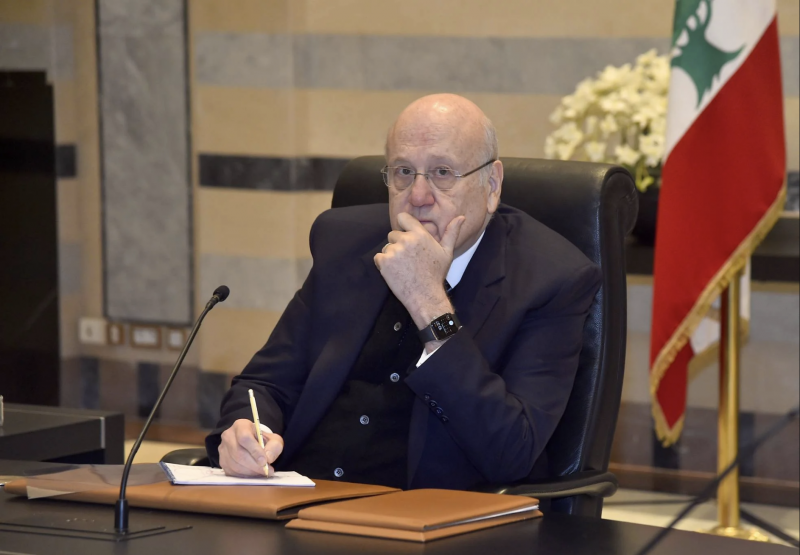
Caretaker Prime Minister Najib Mikati presiding over a cabinet on February 17, 2023. (Credit: Dalati and Nohra)
Everyone agrees: Abbas Ibrahim must remain at the head of the General Security, even after his retirement on March 2. But how? This is the question no one has been able to answer.
With just a week left before the deadline, all eyes are focused on caretaker Prime Minister Najib Mikati, who has been entrusted with the thorny task of finding a legal way to keep Abbas in office, despite his implication in the Beirut port explosion probe.
Parliament Speaker Nabih Berri punted the issue to the Grand Serail, claiming he is unable to convene Parliament during the presidential election period. The parliamentary session that was primarily intended to extend General Ibrahim’s term in office — which Berri tried to convene a little over a week ago — fell through.
The session did not take place after the main Christian parties — the Free Patriotic Movement (FPM) and the Lebanese Forces (LF), as well as several opposition MPs — refused to endorse this approach, Berri labeled as “legislation of necessity.”
As a result, Ibrahim’s term in office will likely be extended through one of the thousands of tricks “Lebanese-style,” while waiting for the presidential issue to be resolved.
According to a parliamentary source who declined to be named, a committee made up of several judges is searching for a way out of this crisis.
In his interview on Tuesday evening with the local Al-Jadeed TV channel, Mikati said he was asked to find “a legal way” to keep Ibrahim in his post as head of General Security. Mikati was careful to underline, however, the responsibility of the legislative branch in this matter.
“The decision [to extend General Ibrahim’s term] should come from Parliament,” said Mikati. “The civil service law stipulates that any civilian civil servant — like Abbas Ibrahim — should retire at the age of 64. Parliament is the only one competent to amend the laws.”
Turning the table
In response to a question on possible pressure from Amal and Hezbollah, to which General Ibrahim is close, Mikati spoke clearly: “I have not spoken neither to Nabih Berri nor Hezbollah.”
Hussein Khalil, the right-hand man to Hezbollah Secretary-General Hassan Nasrallah, confirmed this to L’Orient-Le Jour.
“We did not meet with the prime minister recently,” Khalil said. “It is true that we are in favor of keeping General Ibrahim at the head of the General Security, but it is not up to us to find a way to do so.”
These remarks could be interpreted as a means of denying recent press reports that Khalil and Berri’s political advisor, Ali Hassan Khalil, met with Mikati on Monday to discuss this issue.
Khalil revealed that one possible behind-the-scenes solution is to appoint Ibrahim as an advisor to Mikati. The caretaker prime minister could therefore entrust Ibrahim with General Security management in accordance with the principle of continuity of public service.
Another option — as proposed by Naji Boustani, a lawyer and former minister — involves summoning Ibrahim as a reservist after his retirement on March 2.
“The prime minister will also examine this proposal,” said Ali Darwish, a former MP close to Mikati.
The Democratic Rally, affiliated with Walid Joumblatt’s Progressive Socialist Party (PSP), also presented a draft law postponing the retirement of all heads of the security services for two years.
“But this draft was not adopted, because the parliamentary session was torpedoed,” said PSP MP Hadi Aboul Hosn.
Backed into a corner
In addition to its technical aspect, the extension of Ibrahim’s term is highly political.
Ibrahim is close to Hezbollah and, at the same time, is a rival of Berri. Most importantly, he is charged by Judge Tarek Bitar in the Aug. 4, 2020, blast investigation.
This makes Mikati’s task very difficult, mainly because he does not want to antagonize those against the extension of Ibrahim’s term and shunned the parliamentary session.
At the same time, Mikati does not want to antagonize Berri nor arouse the anger of Hezbollah — his other key supporter along with Berri — that gave him the green light to convene a cabinet meeting in the absence of a president. He, therefore, opted to bury his head in the sand.
This explains why the “cabinet will meet on Monday with a single item on its agenda: to authorize the Finance Ministry to disburse the public sector employees’ payrolls on the basis of the provisional twelfth system,” said caretaker Culture Minister Mohammad Mortada — who is close to the Amal and Hezbollah — told L’Orient-Le Jour.
Aware that the meeting will once again be boycotted by the FPM ministers, Mortada did not rule out the possibility that these ministers may file a complaint to invalidate the cabinet’s decisions.
This scenario could also apply to a possible cabinet decree to extend Ibrahims’ term. Mikati stated in his Tuesday night interview that this approach does not need to be endorsed by the cabinet and can be settled between the prime minister and interior minister.
This article was originally published in French in L'Orient-Le Jour. Translation by Joelle El Khoury.
